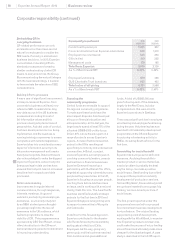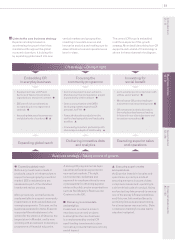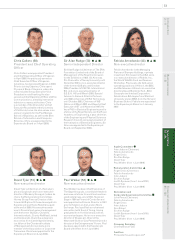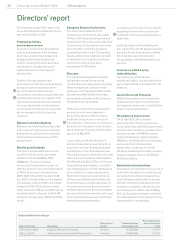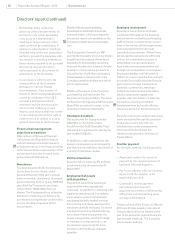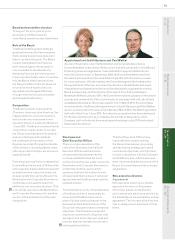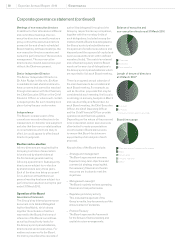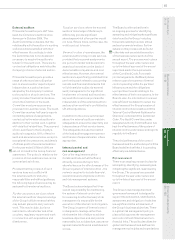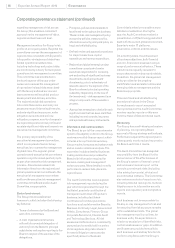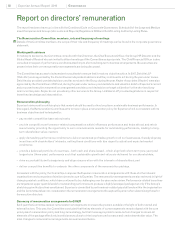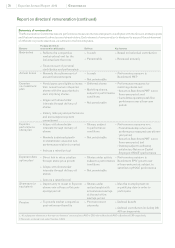Experian 2010 Annual Report Download - page 62
Download and view the complete annual report
Please find page 62 of the 2010 Experian annual report below. You can navigate through the pages in the report by either clicking on the pages listed below, or by using the keyword search tool below to find specific information within the annual report.
Experian Annual Report 2010 Governance60
Corporate governance statement (continued)
Meetings of non-executive directors
In addition to their attendance at Board
and committee meetings, the non-
executive directors normally meet as a
group without the executive directors
present at the end of each scheduled
Board meeting. At these meetings, the
non-executive directors examine and
review the performance of the executive
management. The non-executive
directors also meet at least once a year
without the Chairman present.
Senior Independent Director
The Senior Independent Director is
Sir Alan Rudge. In this role, Sir Alan
is available to meet shareholders who
have concerns that cannot be resolved
through discussion with the Chairman,
the Chief Executive Ofcer or the Chief
Financial Ofcer, or where such contact
is inappropriate. No such meeting took
place during the year under review.
Independence
The Board considers each of the
current non-executive directors to be
independent in character and judgment
and also that there are no relationships
or circumstances which are likely to
affect (or could appear to affect) each
director’s judgment.
Election and re-election
All new directors are required by the
Company’s articles of association
to be elected by shareholders at
the rst annual general meeting
following appointment. Subsequently,
directors are subject to re-election
by shareholders every three years.
Each of the directors being proposed
for re-election at the 2010 annual
general meeting has been subject to a
performance evaluation during the year
ended 31 March 2010.
Operation of the Board
Governance framework
The Group’s key internal governance
document is its Global Delegated
Authorities Matrix, which draws
together the schedule of matters
reserved to the Board, the terms of
reference of the Board committees
as well as the authority levels for
the Group’s principal subsidiaries,
directors and senior executives. For
matters not reserved to the Board,
the matrix prescribes the cascade of
authorities delegated throughout the
Group by respective Group companies,
together with the monetary limits of
such delegations. Included among the
matters that the Board has delegated to
the Group’s principal subsidiaries are
the approval of smaller acquisitions and
disposals and the approval of capital and
revenue expenditure (all within dened
monetary limits). The matrix is reviewed
and refreshed regularly and the Board
monitors the exercise of delegations to
the Group’s principal subsidiaries which
are reported to it at each Board meeting.
There is an agreed annual calendar of
the main business to be considered at
each Board meeting. For example, as
well as the other proposals that may be
considered at each meeting, the focus is
on strategy in January, budgets in March
and results in May and November. At
each Board meeting, the Chief Executive
Ofcer, the Chief Operating Ofcer
and the Chief Financial Ofcer provide
operational and nancial updates.
Depending on the nature of the proposal
to be considered, senior executives are
often invited to make presentations
or participate in Board discussions
to ensure that Board decisions are
supported by a full analysis of each
proposal.
Key activities of the Board include:
Strategy and management
–
The Board approves and oversees
Experian’s long-term objectives and
commercial strategy, ensuring that
the necessary nancial and human
resources are in place to meet the
objectives.
Management oversight
–
The Board routinely reviews operating,
nancial and risk performance.
Regulatory/statutory activity
–
This includes the approval of the
Group’s results, key documents and the
announcement of dividends.
Finance/Treasury
–
The Board approves the framework
for the Group’s nance, banking and
capital structure arrangements.
Balance of executive and
non-executive directors at 31 March 2010
Executive
Chairman
Non-executive
Length of tenure of directors
at 31 March 2010*
3-4 years
0-3 years
* Company incorporated in July 2006
Board time usage
M&A
Governance
Operational and nancial performance
Investor relations
Other


